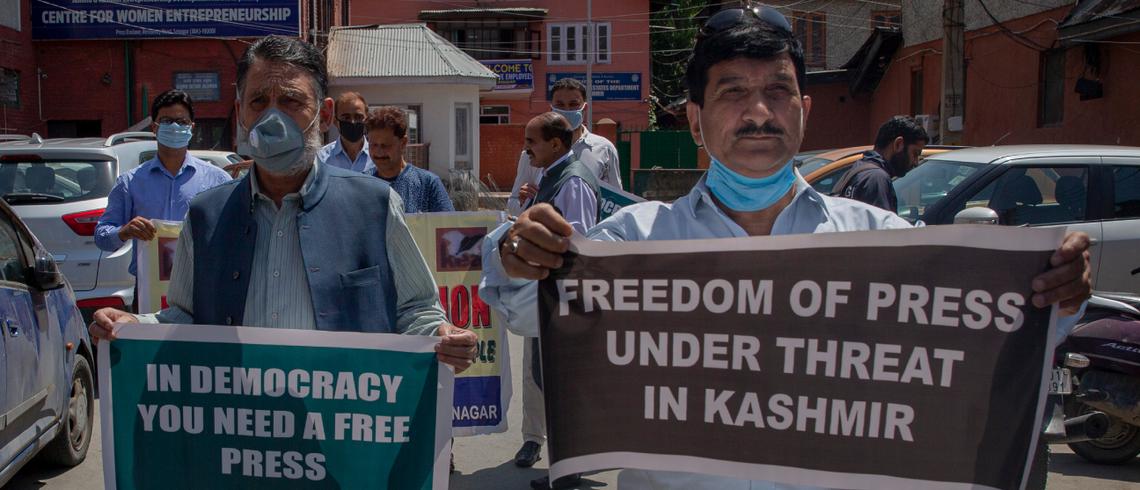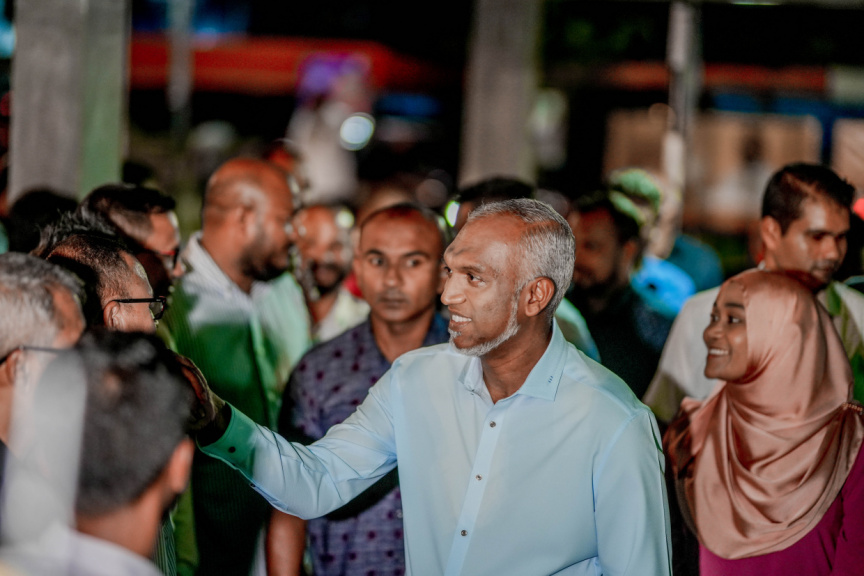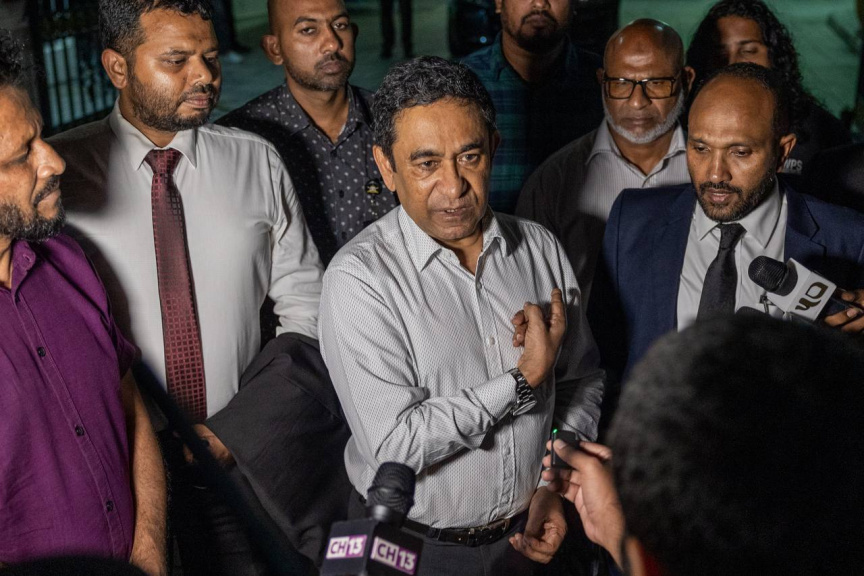The Indian government has taken over the club’s premises citing a “security threat” but local reporters say that this was the only “safe space” for journalists in the contested region.
The Indian government has taken over the land and property of the Kashmir Press Club (KPC), citing an “emergent law and order situation”.
“An intervention has become imperative in [the] view of social media and other reports, pointing towards [the] likelihood of [a] breach of peace and imminent threat to [the] lives of journalists, including from cross border successionist-terrorist networks,” the administration said in a statement.
Critics see the move as part of the government’s clampdown on the media fraternity of India-administered Kashmir, a disputed territory between New Delhi and Islamabad.
The human rights situation in Kashmir has severely deteriorated since Narendra Modi’s Bharatiya Janata Party (BJP) came to power in the centre in 2014.
In August 2019, New Delhi unilaterally abrogated Article 370 of the Indian constitution, snatching Kashmir’s autonomy and reducing it to a union territory led by a governor directly appointed by New Delhi.
Since then, the Muslim-majority state has frequented the news for reasons ranging from mass detentions and police brutality to the systemic abuse of human rights activists and journalists. Local journalists have played a key role in highlighting these issues.
Journalists in Kashmir say that the Kashmir Press Club (KPC) is the only space where they can gather to discuss story ideas and share tips over cups of tea and cigarettes. The building for the press club was allocated in 2019.
“Something like this to happen is unprecedented,” said Anees Zargar, a local journalist.
“KPC does not work like a typical press club as in other parts of the country. It’s a space where a lot of young journalists now come to file their stories. Most of them are freelancers who work for foreign publications. They have few places where they can sit and write.”
The official takeover of the KPC comes on the heels of a bizarre incident that played out over the weekend.
On Saturday, a group of around a dozen Kashmir-based journalists forced their way inside the premises of the press club, under the protection of the police, and forcibly took over the management.
Saleem Pandit, the leader of the group, is a correspondent for the Times of India, one of the country’s largest newspapers. He reportedly arrived at the press club alongside heavily armed police personnel.
Pandit’s work is often praised by pro-establishment journalists in New Delhi, also called “Godi media”, a pejorative term meaning “lapdog media”, who are accused of pandering to the messages of the far-right Hindu nationalist government. In July 2019, Pandit labelled some members of the KPC as “jihadists”, drawing ire from its members.
The Press Club’s management is elected by its 300 members. The elections had been due since last year but couldn’t take place because the government reportedly dragged its feet on issuing the relevant permission.
The Pandit-led group says it was forced to take this drastic step because the previous management had failed to hold an election on time.
“It seems the ultimate goal was to shut down the Kashmir Press Club, and for this purpose they tried to install a group of journalists,” said Ishfaq Tantry, the general secretary of the club’s elected management, in a statement.
Stifling the messenger
Continuous police harassment has made the work of journalists nearly impossible in the disputed territory where India maintains a military presence of hundreds of thousands of soldiers.
Reporters are routinely accused of working for Pakistani spy agencies, and are summoned to police stations for questioning. In most cases, the authorities interrogate them over writing articles or tweets that show the New Delhi-led administration in the disputed territory in a bad light. Some journalists have been questioned for covering protests triggered during the funerals of gunned down Kashmiri militants.
Dozens of journalists have been arrested or questioned since August 2019.
A recent example involves the arrest and incarceration of Sajad Gul, a student and freelancer working for the Kashmir Walla news magazine.
Gul was arrested and charged under the notorious Public Safety Act, which allows police to detain an accused person for months without any formal trial. Gul has been sent to prison.
Authorities accused him of ‘incitement’. He had posted a video of women chanting slogans at the funeral of a militant, which did not go down well with the government. He also faced state censure last year for his news story on the bad conduct of local officials.
The UN Special Rapporteur for the freedom of expression has raised concerns about the arbitrary detention and proceedings against Gul and other Kashmiri journalists.
“Police call us on the phone, they take our salary details, family details, it’s a very humiliating experience,” said a journalist who requested anonymity.
New Delhi has used various tactics to stifle Kashmiri press ranging from withholding government advertisements to repeatedly summoning editors to police stations for questioning.
Kashmiri press flourished in the mid-2000s when India and Pakistan agreed to diffuse long-standing tensions and started a dialogue process. The famous Musharraf-Vajpayee parleys created a positive environment in the disputed region, allowing young journalists to aspire to become full-time reporters for both Indian and foreign media outlets.
As the peace process failed and border skirmishes between the archrivals resumed, the rhetoric from both sides became shrill.
Much of India’s mainstream newspapers continued to take the government’s line on Kashmir, alienating Kashmiri readership. Now, locals have come to rely more on Kashmiri media for updates on military operations and arbitrary detentions, Ipsita Chakravarty wrote, last year, for a Reuters Institute for the Study of Journalism paper.
But under the BJP government, dissenting voices have been silenced elsewhere in India, human rights groups said.
And in this context, it is important to highlight what has happened at the KPC, journalists said.
“Remember if something like this can happen in Kashmir, it can happen somewhere else [in India],” said Zargar.
Source: TRT World (Saad Hasan)

 News5 days ago
News5 days ago
 Business7 days ago
Business7 days ago
 World5 days ago
World5 days ago
 News2 days ago
News2 days ago
 World5 days ago
World5 days ago
 Travel & Culture3 days ago
Travel & Culture3 days ago
 Sports2 days ago
Sports2 days ago
 News3 days ago
News3 days ago


















